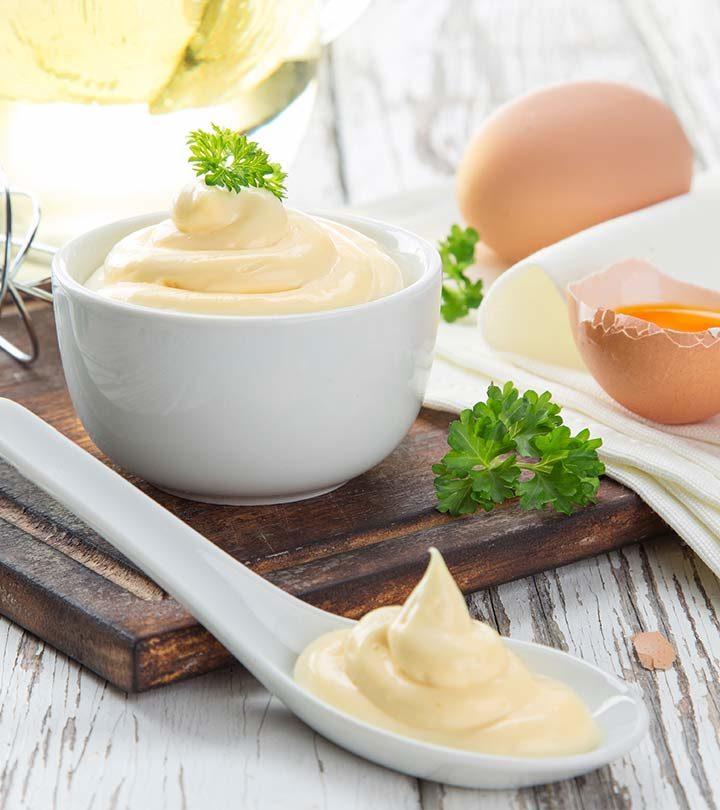Is Duke's Mayo Safe to Eat While Pregnant

Image: iStock
You may have never thought twice before eating mayonnaise or mayo as a spread on your sandwich or burger. But when you are pregnant, it becomes one of the 'dilemma foods' because you are not sure whether it is prepared with raw or pasteurized eggs.
MomJunction tells you if you can eat mayonnaise when pregnant, and when you should avoid it.
Can You Eat Mayonnaise When Pregnant?
Mayonnaise is made both with egg and without it. Eggless mayonnaise contains olive oil or canola oil instead of egg as the base ingredient (1). Both types can be used during pregnancy.
However, eating mayonnaise prepared with egg is considered safe if it is made of pasteurized (heat-treated) eggs. It is made of egg yolk, mixed with vegetable oil, and lemon juice or vinegar. Protein and lecithin in the egg yolk act as emulsifiers in mayonnaise (2).
Commercial mayonnaise available on the non-refrigerated shelves in supermarkets is made of pasteurized eggs and is safe for consumption. Brands such as Hellmann's and Heinz are popular varieties of mayonnaise that are safe to eat (3).
However, avoid home-made mayonnaise as it is made of raw eggs, which run the risk of containing salmonella (4).
Mayonnaise sold in the restaurants or food markets may be avoided unless you are sure that they use pasteurized eggs.
Types Of Mayonnaise
You can select a mayonnaise that suits your requirements of fat and calories, as the spread is made with several variations. Here are a few (5):
Real mayonnaise meets the Codex Alimentarius food standards with fat content of 78.5% and egg 6%.
Full-fat mayonnaise contains 65-75% fat.
Light mayonnaise, as the name suggests has low fat content of 20-30% and around 3% egg. They include thickening agents such as maize starch and xanthan gum.
Extra mayonnaise contains less than 10% fat and 4% egg.
Nutritional Values In Mayonnaise
Even if you are opting for commercially made mayonnaise, know the nutritional values before consumption as it could be high in calorific values.
- One tablespoon (14g) of mayonnaise contains around 94 calories, or 100gm contains 700 calories of fat. The calorific value however differs with respect to the type of mayonnaise.
- One tablespoon also has 5.8mg of cholesterol. The 2010 Dietary Guidelines for Americans recommends consuming not more than 300mg a day. (6)
- There can be 80mg to 125mg of sodium in one tablespoon of mayonnaise, while the recommended daily intake of sodium should be less than 2,300mg.
- Commercial mayonnaise contains 80% vegetable oil, 8 % water, 6% egg, 4% vinegar, 1% salt, and 1% sugar.
- Low-fat mayonnaise has around 50% vegetable oil, 35% water, 4% egg, 3% vinegar, 1.5% sugar, and 0.7% salt.
Benefits Of Mayonnaise
Mayonnaise, when eaten in limited quantities, can be good for health. Here is how it can be beneficial for you.
- Vitamin K: One tablespoon of regular mayonnaise has around 22.5 micrograms (mcg) of vitamin K, which is more than 25% of the daily requirement of 90mcg (AI) (7).
Vitamin K is important during labor as it helps in clotting and prevents excess bleeding. In babies, it is required for the development and normal blood clotting (8).
- Fat content: One tablespoon of regular mayonnaise has 2.32g of total MUFA (monounsaturated fatty acids) and 6.17g of total PUFA (polyunsaturated fatty acids). Maintaining a healthy MUFA:PUFA ratio is important during pregnancy as it not only affects mother's health but also the health and development of the growing fetus (9)
Total fat during pregnancy is required for the body in small amounts only. Any excess of saturated fat puts you at risk of excess weight gain and abnormal lipid profile. Mayonnaise has saturated fat that is not good for health when consumed in high amounts.
Remember that mayonnaise need not be taken as a health food during pregnancy as you can get these vitamins and fat from other healthier foods.
How Can Mayonnaise Be Harmful During Pregnancy?
Mayonnaise is not an outright harmful food, however, its consumption during pregnancy must be done cautiously. Here are a few reasons why it should be avoided or limited to small amounts during pregnancy.
- Bacteria: If you consume mayonnaise that is infected with salmonella, it could lead to extreme dehydration, bacteria in the bloodstream, meningitis, and reactive arthritis. Also, your baby can get infected with salmonellosis.
Mayonnaise made with raw egg can also have the risk of containing listeria bacteria, which can lead to listeriosis, a very rare disease during pregnancy. (10)
- High calories: Adding a teaspoon of mayonnaise once in a while may not be such a problem in this case. However, use of mayonnaise in high amounts and on a regular basis could lead to overconsumption when combined with other high calorie food that you take every day. This could lead to excess weight gain.
- Fat content: During pregnancy, your body needs more fat than usual due to physiological reasoning such as gaining fat tissue around the pelvic area to support the labor process. Therefore, 30-35% of your total calories must come from fat and preferably MUFA (11). However, overconsumption must be avoided. A study in 2016 found that excess fat consumption by the mother can damage the baby's immune system (12). Another study by The Cleveland Clinic and West Virginia University, says that children born to mothers with high fat levels will have obesity problems later in their life.
- Sugar and sodium levels: Mayonnaise is high both in sugar and sodium, the two ingredients which need to be taken in limited quantities during pregnancy. Research studies have shown that in the long run, high sugar foods can lead to diabetes and sodium could potentially increase your blood pressure (13).
- Artificial preservatives: Mayonnaise available in the market is preserved with chemicals and additives. They are mostly safe but some women might have side-effects such as nausea and weakness. They can also prove to be allergic to some women, putting their pregnancy at risk.
Safety Measures
How can you satisfy your urge to eat mayonnaise while not getting affected with its side-effects during pregnancy? Follow these safety measures and enjoy your spread:
- Check the ingredients: If you are eating mayonnaise at a restaurant or an eatery, always find out the ingredients that have gone into it. Do not shy away from asking if the eggs used were pasteurized. If they were raw, make sure that they are British Lion stamped, as they are safe for consumption.
- Check the label: Do check the label of mayonnaise you buy in the supermarket to know its fat content, information on preservatives, and more such details. Check whether or not the mayonnaise contains raw eggs, and if yes, do not eat them.
- Use a clean knife: When taking mayonnaise out of the jar, to apply on your food, use a clean knife to ensure that there are no bacteria or germs on it.
Alternatives To Mayonnaise
Any variations of mayonnaise that do not contain egg are not considered to be mayonnaise in the US, as the Food and Drug Administration does not allow for their labeling in that name (14).
Egg-free alternatives to mayonnaise are a great choice for pregnant women who are allergic to egg or are vegans. Brands such as Nayonaise and Vegenaise in the US, and Plamil Egg Free in the UK are famous substitutes for mayonnaise.
If you love to have your sandwiches or bread with a spread but want to avoid mayo during pregnancy, opt healthier alternatives such as:
- Tofu mayonnaise
- Almond and cashew paste spread
- Plain yogurt
- Mustard
- Fat-free sour cream
Frequently Asked Questions
1. Why is commercial mayonnaise safe?
Commercial mayonnaise are safe and bacteria-free because they are prepared from pasteurized eggs and undergo a series of processes that kill food-borne illnesses.
The Association for Dressings and Sauces in the US has observed that commercial mayonnaise does not cause foodborne illness as it is made of pasteurized eggs.
The presence of salt, lemon juice, and other acids do not allow the growth of bacteria.
2. Are Hollandaise and Bearnaise sauces safe to eat during pregnancy?
Both Hollandaise and Bearnaise sauces are made of egg and clarified butter. The two ingredients are mixed on low heat. This is different from mayonnaise because mayonnaise involves blending of eggs with vegetable oil, without any heating.
Just like mayonnaise, they may be eaten if the eggs are pasteurized and are not home-made. Heating can kill infection-causing bacteria to an extent, but pregnancy is not the time to take such risks.
3. Can I consume expired mayonnaise when I am pregnant?
Generally, expired mayonnaise is not harmful. It can be eaten for three to four months after its 'best-before' date if it is a branded product and stored at the right temperature after opening it.
However, it is advisable not to eat it during pregnancy as any growing bacteria can affect your health.
You need not have to control your urge to eat mayonnaise during pregnancy because small amounts occasionally will not harm you or your baby. However, what you need to remember is to avoid home-made mayonnaise.
Did you crave mayonnaise or any other spreads while pregnant? Let us know in the comments section.
References:
MomJunction's articles are written after analyzing the research works of expert authors and institutions. Our references consist of resources established by authorities in their respective fields. You can learn more about the authenticity of the information we present in our editorial policy.
Recommended Articles:
- Is It Safe To Eat Cheesecake During Pregnancy?
- Salmonella Poisoning During Pregnancy – Everything You Need To Know
- Is It Safe To Eat Caesar Salad During Pregnancy?
- Top 10 Nutritional Foods To Eat During Pregnancy
The following two tabs change content below.
- Reviewer
- Author

Celebrity nutrition advisor Dr. Shikha Sharma has founded Dr. Shikha's Nutrihealth in 1998. Dr. Shikha has done her MBBS from Maulana Azad Medical College and her organization, Dr. Shikha's NutriHealth, has over 50 Ayurveda experts and nutritionists who provide consultation services to the clients. The Nutrihealth expert team handles weight loss/weight gain, PCOS, thyroid, diabetes, cholesterol, post-pregnancy weight loss and... more

Swati Patwal is a clinical nutritionist and toddler mom with over eight years of experience in diverse fields of nutrition. She started her career as a CSR project coordinator for a healthy eating and active lifestyle project catering to school children. Then she worked as a nutrition faculty and clinical nutrition coach in different organizations. Her interest in scientific writing... more
Is Duke's Mayo Safe to Eat While Pregnant
Source: https://www.momjunction.com/articles/is-it-safe-to-eat-mayonnaise-when-pregnant_00376950/